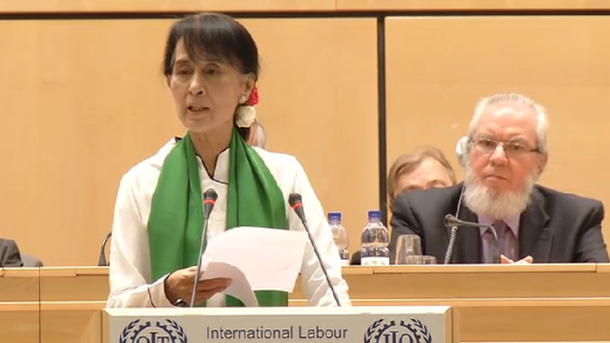Aung San Suu Kyi called for sustainable investment linked to job creation at the International Labour Organization (ILO) on Thursday morning just as Burma is reinstated as a member.
“We need investments to be linked to job creation,” the Burmese opposition leader told the International Labour Conference at the Palais des Nations in Geneva. “We understand that investments are not altruistic … Investments must lead to profits, but we would like these profits to be shared with our people.
“Unless we aim at achieving the best that is possible we will have to make do with the least that is tolerable,” the Nobel Laureate told ILO delegates. “No country can claim genuine development until its people can enjoy basic freedoms—freedom from want and freedom from fear.
“Burma has attracted the acute attention of business interests as well as international governments. As rights should be balanced to responsibilities, opportunities must be balanced by probity if we are to avoid worker exploitation.”
The ILO decided on Thursday that sufficient progress is being made under the administration of reformist President Thein Sein to welcome Burma back into its membership. However, humanitarian groups have warned that serious abuses including the use of forced labor remains rife in the military-dominated Southeast Asian nation.
Yet the National League for Democracy (NLD) chairwoman saw Burma’s reinstatement in a positive light.
“I welcome the resolution [to allow resumed membership for Burma] that will enable the ILO to work more effectively to resolve labor issues in our country,” said Suu Kyi.
“We are not just a family of nations; we are a family of peoples. People to people relations are the most important. I would like you to think of Burma as a nation of peoples—human beings like all of you.”
Reinstating Burma as a full member of the ILO follows an undertaking by the Burmese government to eliminate forced labor by 2015. Burma has faced restrictions on its membership for the past 13 years because of the repeated failure to respond to calls for basic workers’ rights.
Suu Kyi made the visit to Geneva, her first for 30 years, as the initial stop on her first trip to Europe since 1988, having spent 15 of the last 24 years under house arrest in Burma.
“The NLD has repeatedly emphasized the need for rule of law and the end to ethnic conflict. Strong democratic institutions that guarantee human rights are required to ensure good governance,” said Suu Kyi.
“[Workers representatives] highlighted the importance of legislation that protects the rights of workers [as well as] sufficient protection from government interference in trade unions and that strike regulations should be relaxed.”
“Greater transparency is needed in the legislative process so the views of stakeholders are taken into account. The creation of job opportunities was also a high priority—ranging from direct foreign investment to the role that the government should play to ensure best practices.”
Readmission to the ILO was seen as vital towards negotiating further trade concessions in the wake of the easing of international sanctions—specifically the key inclusion in the European Union and World Trade Organization generalized system of preferences, which reduces tariffs for developing nations.
Suu Kyi went on to talk about youth unemployment and the importance of investment that creates jobs.
“It is not so much joblessness as hopelessness that threatens our future,” said the 66-year-old. “Unemployed youth lose faith in the society. Reckless, directionless youth agonize over the fruitlessness of their lives.
“I was amazed with what intelligence young people responded to our [by-election] campaign. The spirit of political participation was being instilled in them.
“Foreign direct investment that results in job creation should be invited,” she said, adding that track records on sustainability and protecting the environment should be taken into account. “State enterprises marked for privatization should be made more competitive.”
But she added a note of caution for resource-rich Burma, saying that “investment in the extractive industries should be approached with particular care.”
Suu Kyi also touched on the issue of migrant workers by describing her visit to the Thai port town of Mahachai, south of Bangkok, which is home to the largest number of the 2.5 million Burmese currently working in Thailand.
“More than 80 percent of migrant workers in Thailand are from Burma,” she said. “Migrant workers should receive similar attention to the concerns of workers in our own country. I appeal to the ILO to join efforts to build a home that is a true sanctuary for all our people.”
Finally Suu Kyi invited delegates to come and see the changes taking place in Burma for themselves.
“I would like all of you to come to Burma … not just to see investment opportunities or investigate workers problems but to see our potential,” she said.
















